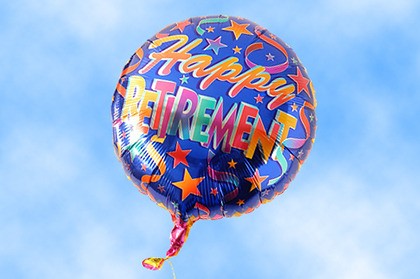Retirement is an artifice, an invention of the 20th century. Before then, people hardly ever retired. They stopped working when they couldn’t do their (mostly physically demanding) jobs any longer, and soon thereafter they usually died.
Now, every day about 10,000 members of the Baby Boomer generation enter what is commonly considered retirement age at 65.
What does this mass exodus from the work force entail? Predictions range from the sanguine to the dire about the prospects of today’s retirees. On the one hand, especially well-to-do older adults who are reasonably healthy have many more options to fill their ‘golden years’ with activities and pursuits than their forbearers could ever imagine.
By contrast, insufficient financial security and chronic diseases can lead to a rather precarious endgame. For most, it will be something in between.
For the lucky ones, retirement can really be a glorious time. According to a recent study, being freed from work-related and other demands can allow for lifestyle changes that enhance health and well-being.
“A major life change like retirement creates a great window of opportunity,” says Dr. Melody Ding, a Senior Research Fellow of the School of Public Health at the University of Sydney, Australia, and lead author of the study report. “It’s a chance to get rid of bad routines and engineer new, healthier behaviors.”
That would be a desirable outcome. However, there are also challenges waiting for retirees that are not always easily overcome. Routines that helped structure their days and that are now falling by the wayside can leave a considerable void. Those who have no plans other than getting more sleep or enjoying a favorite pastime (golf comes to mind) can find themselves unprepared for that extra amount of leisure. Losing one’s professional identity, feeling no longer needed or being bored can result in low self-esteem and depression.
One study from Harvard University found that newly retired men and women faced a 40 percent higher risk of suffering a heart attack or stroke than their contemporaries who were still in the workforce. The increase was most pronounced during the first year of retirement and gradually leveled off after that.
Moving from working to not working brings a whole host of disruptions along, many of which don’t become immediately evident. But the effects are very real and can lead to serious problems if they are not constructively addressed.
“Our (study) results suggest we may need to look at retirement as a process rather than an event,” says J. Robin Moon, a researcher at Harvard’s School of Public Health and lead author of the study.
The process can be a smooth or a bumpy ride, depending on a wide range of factors.
Financial stability is certainly part of it, but for retirement to succeed, many other components need to be in place as well. Most important are a supportive social life as well as engagement in meaningful, stimulating activities such as travel and continuing education, among countless other options.
To maintain both physical and mental health, there are no better means than preventive measures, including an age-appropriate eating and exercise regimen.
However, such steps should be taken long before actual retirement takes place. People need to prepare themselves thoroughly for this transformative time, preferably several years in advance, experts recommend.
The tremendous changes newly retired persons experience can affect their lifestyles favorably or unfavorably, says Else Zantinge, a researcher at the National Institute for Public Health and the Environment in the Netherlands who conducted studies on the health affects of retirement. The pre-retirement period should be used as an opportunity to make the transition as easy as possible.
Timi Gustafson R.D. is a registered dietitian, newspaper columnist, blogger and author of the book “The Healthy Diner – How to Eat Right and Still Have Fun”®, which is available on her blog and at amazon.com. For more articles on nutrition, health and lifestyle, visit her blog, “Food and Health with Timi Gustafson R.D.” (www.timigustafson.com). You can follow Timi on Twitter, on Facebook and Google+.


